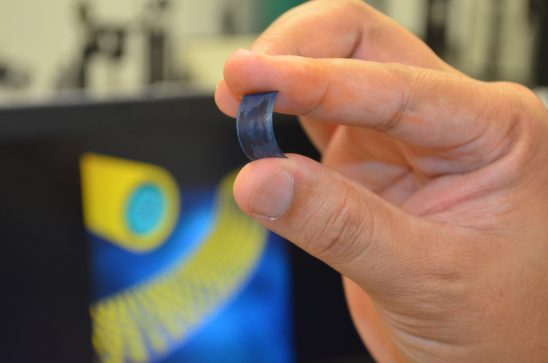New battery prototype charges in seconds, lasts for days

This battery prototype is a proof of concept that can recharge in just seconds and hold days’ worth of energy, as well as last for over 30,000 cycles. Image University of Central Florida
In spite of how powerful smartphones and other handheld devices have become, they continue to be hindered by inefficient battery technology that can offer only hours’ worth of energy. But the future is looking up, thanks to a prototype recently made by researchers from the University of Central Florida (UFC).
The prototype is a supercapacitor battery that continues working like new even after 30,000 recharge cycles. If researched thoroughly, ultra-fast-charging batteries that lasts more than 20 times longer than lithium-ion cells could be made available in the market, reports Engadget.
“You could charge your mobile phone in a few seconds and you wouldn’t need to charge it again for over a week,” says UCF postdoctoral associate Nitin Choudhary.
The reason why supercapacitors are able to charge quickly is that electricity is statically stored on material surfaces instead of the traditional chemical reactions in standard batteries.
UFC’s team of researchers developed supercapacitors composed of millions of nanometer-thick wires which have been coated with several layers of two-dimensional materials. Its highly conductive core makes it possible for electrons to transfer in and out quickly for extremely fast charging and discharging. At the same time, two-dimensional materials that have been uniformly coated yield high power and energy densities.
Two-dimensional materials have long been seen as having promising potential to replace existing battery technology. The UFC-developed process is a proof of concept on how to realize this potential.
“It’s not ready for commercialization, but this is a proof-of-concept demonstration, and our studies show there are very high impacts for many technologies,” says principal investigator Yeonwoong “Eric” Jung, an assistant professor with joint appointments to the NanoScience Technology Center and the Materials Science & Engineering Department.
A battery that requires so little input yet stores a tremendous amount of juice could change how we view solar power as well. Just imagine stepping out to charge a smartphone with a portable solar charger for just a few minutes. The impact of this technology for electronic devices will be tremendous! Alfred Bayle